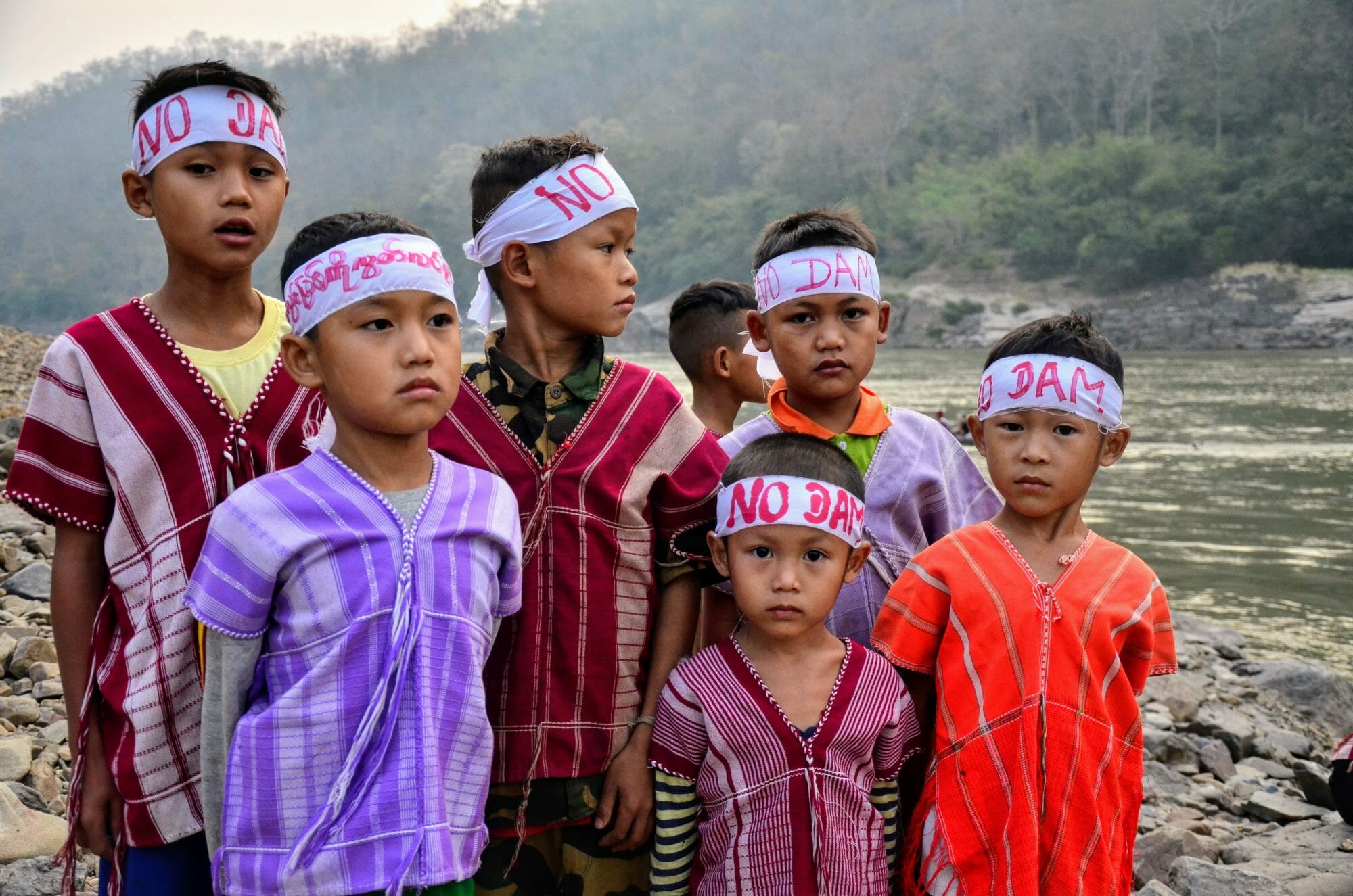A team of campaigners and lawyers from EarthRights International joined indigenous Karen communities on the Salween again this year to celebrate the International Day of Actions for Rivers on March 14th. This year, we joined the small communities in Eu-Wae-Tta Internally Displaced Person camp for a celebration, in solidarity with communities impacted by any dam projects anywhere on the Salween River. Affected communities should be heard regardless of their ethnicity, geographic location and socioeconomic status. Today is the day to celebrate solidarity across the globe and embrace the struggle we share to protect our rivers.
Karen Culture Teaches: If We Eat Fish, We Must Protect the River.
The frontline Karen communities and internally displaced persons living in Eu-Wae-Tta camp, in Mae-Sarieng district, Thailand, had a lot to say. The event began with a song, which shares teaching from Karen elders:
Kin-pla-tong-rak-sa-nam (if we eat fish, we must protect the river)
Kin-kied-tong-raksa-pah (if we eat small frog, we must protect the forest)
Kam-bok-lhao-of-pu-thao-bai-ya (teaching from old wise man in Karen culture)
Hai-rak-phuen-pa-Salween (protect the Salween river)
-The Salween in the world song, by Kru Ped

Earth rights defenders float a sign on the Salween River on International Day of Action for Rivers.
Salween Dams: A Conflict of the Commons
The Salween River crosses country borders. It supports the lives of millions of culturally and ethnically diverse communities who live along its riverbanks. The Salween doesn’t stop at the border of Thailand and Myanmar — it lays itself as the borderline and it provides fisheries and food to the riverside communities. But, there are those who see the river as a resource to advance development for the nation through mega-dam projects. Many communities who depend on the river for their livelihoods disagree. Pati Pairot Panapraisakul, Chairman of the Salween People Network based in Tatafang village on the Salween said in his remarks that:
“Salween is everything to us. It is as important as our home and our land. We, the Salween People Network call the governments of Thailand, Myanmar and China to stop building dams on the Salween River.”
There are various dams planned on the Salween River, including the Mongton and Hatgyi dams. Both are backed by Thai and Chinese investors, with the support of the Myanmar government. Large dams such as Mongton and Hatgyi, which would produce more than 1000 MW, are said to be a fast-track for revenue that would bring Myanmar out of poverty. Thai investors such as the Electricity Generating Authority of Thailand (EGAT) have invested in Mongton and EGAT International, an EGAT affiliate, has invested in Hatgyi Dam. The river resources that support millions of people have been targeted for exploitation to serve the interests of these investors, but both dams would be built at the expense of frontline indigenous communities.
The Salween is at a Crossroads: Concerns Over Hatgyi Dam
Hatgyi Dam is projected to cost 100 billion baht (over 3 billion US dollars) and is commissioned by Electricity Authority of Thailand International (EGATi), China’s Sinohydro Corporation, Myanmar’s Ministry of Electric Power, and the International Group of Entrepreneurs. The Hatgyi dam is expected to produce 1,360 MW of electricity and more than 90% will be exported to Thailand. In May 2016, Thailand’s government released the Cabinet Resolution to regulate Thai Outbound Investment overseas and recommended that concrete steps be taken to follow the United Nations Guiding Principles on Business and Human Rights (UNGPs). It is mandatory for Thai investors to comply with these principles and conduct human rights due diligence while operating overseas.
Dams on the Salween such as Hatgyi could damage the livelihoods of the millions who rely on the river. On the Thai side of the Salween, approximately 10,0000 indigenous Karen communities will feel the effects of the dam’s transboundary impacts. If the dam is built, the river will be altered, and as a result, their environment and livelihoods will be damaged and their community’s rights to natural resources will be violated.
“We need peace and freedom, as it is the only way to bring us equality and to ensure our community’s rights to natural resources and land are respected,” said Pati Saw Cher Tu Plor, Head of the Eu-Wae-Tta camp.
 March 14th, a Celebration of Solidarity
March 14th, a Celebration of Solidarity
The celebration at Eu-Wae-Tta IDP camp this year reminded us that when homelands and livelihoods are destroyed, affected communities are forced to be displaced and have to migrate.
Saw Ya Se, a youth leader from the camp who joined the event said, “We don’t want to be displaced forever, we were displaced from our homes in Myanmar and now we don’t have the same rights as others. We want freedom and peace, as it is the only way to bring us the equality and to realize our rights such as right to nationality, right to food security, and rights to land.”
The International Day of Actions for Rivers is the day to share concerns and realize that the communities do not fight alone. There are many communities on both sides of the Salween and on rivers around the globe that are affected by dams.
Teacher Nor Tam La Wa from Jean Cesare Saccaggi school in Eu-Wae-Tta camp spoke about why the Salween people must be in solidarity and fight together: “This is the day we realize that our solidarity is strong and our voices are heard on the day like this. We must stay in solidarity and fight together. As the old Karen saying goes: ‘We must protect our home and our lands, as our lives rely on them.”






